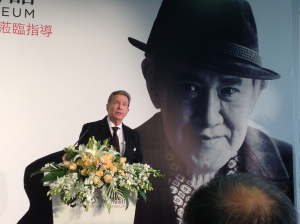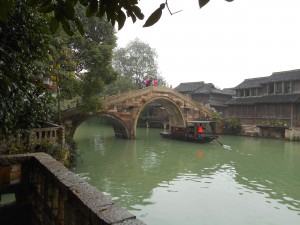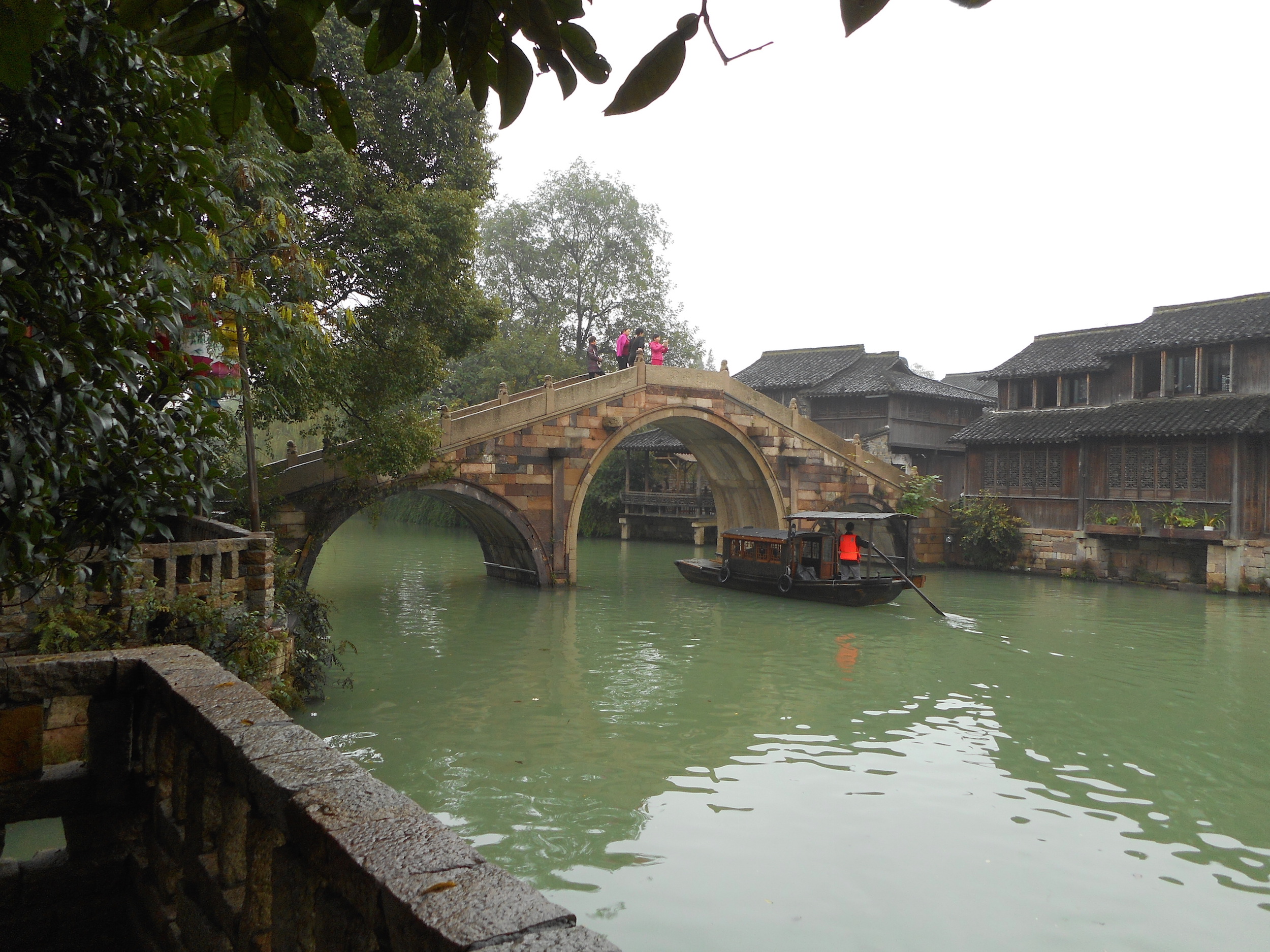THERE ARE TWO REASONS why readers of this magazine might be interested in the Chinese writer and visual artist Mu Xin (1927-2011). First, his writings and ink paintings are extraordinary; and second, though the fact isn’t widely known, he was gay. I was introduced to his work by Joanne Wang, the literary agent and translator who found a publisher for the first English translation of his fiction. This was the volume of short stories titled An Empty Room, published by New Directions in 2011. To date, it is the only work of his available in English, though Ms. Wang last year published a collection of interviews with him titled Mu Xin: The Literary Odyssey.
“Odyssey” fits his story well. He was born into a wealthy and cultivated family in the town of Wuzhen in Zhejiang province. A family friend named Mao Dun, a well-known writer in the early 20th century, made his library available to the young Mu Xin, introducing him to Western literature at the same time that he was mastering the Chinese tradition of literature and painting. As a young adult Mu Xin went to Shanghai to study art and made important literary and artistic connections there, during a period when that city was at the vanguard of new artistic movements. The Communist regime beginning in 1949 had a chilling effect on Chinese art, the low point coming during the Cultural Revolution of 1966 to 1976, when there was an effort to expunge both the Chinese classical tradition and any new modernist works in favor of an art whose sole purpose was to serve as state propaganda. Former members of the ruling class were executed, imprisoned, or relegated to agricultural villages in the provinces for “re-education.” Lucky not to be shot, Mu Xin was imprisoned under horrible conditions but somehow survived. He even emerged with a collection of writings that he had succeeded in producing during his imprisonment. After his release, he managed to get to New York, where he lived from 1982 to 2006, nearly a third of his lifespan. Then, the political atmosphere in China having changed, he was invited by authorities in Wuzhen to return to live in his childhood house, which the town had renovated. In consideration of his age, he was even provided with two young (and handsome) assistants to make the transition easier. Five years later, he died.
Still, I was surprised when an invitation arrived to participate in the opening of the new museum this past November. It involved being one of the speakers at the ceremony, all travel and housing expenses paid. Joanne Wang urged me to come, so of course I accepted. When she and I arrived at Shanghai’s Pudong Airport, a car was waiting to drive us to Wuzhen, about two hours away. Our hotel was situated inside a kind of theme park, a modern reproduction of a traditional Chinese village, built on both sides of the river that runs through Wuzhen. Cars are banned from the park, and boatmen pole tourists along the river in vessels that could be called gondolas, but the resemblance to Venice stops there. Instead, a conglomeration of small houses with tiled roofs and upcurving eaves, an occasional stone bridge, and quite a few trees in vest-pocket parks are scattered throughout the village.
Next day, we visited Mu Xin’s house, a few rooms of which are now open to the public, exhibiting photographs of the artist and some of his personal effects, including his pipe and cane, and a photograph of André Gide. There are also a few artworks, which included studies of the nude male body. It’s gratifying to reflect that, after an adulthood of poverty and imprisonment, he had been allowed a few comfortable years before his death in the very house where he’d lived as a child with his parents and siblings.
The main event was still to come, the museum opening scheduled for November 15th. The modernist building, designed by Hiroshi Okamoto and Bing Lin of the American studio OLI Architecture, consists of a series of interconnected pavilions in textured concrete that seem to float over Wuzhen’s Lake Yuanbao. The architects have said they wanted to echo the riverine atmosphere of the town. They succeeded in producing one of the most magical museums ever built, with handsome structures doubled in watery reflections on all sides. The inaugurating ceremony was held in a vast building with perhaps 400 seats, nearly all filled, with an audience both Chinese and international. Media and documentary filmmakers were present, and a translator was provided. Cameras flashed as each speaker addressed the audience. I gave my comments and listened to the others, among them Chen Danqing, who spoke warmly about his friend and mentor.

Next we were guided to the museum itself for the ribbon-cutting, then allowed to wander at leisure through the exhibition rooms. Holograph texts by Mu Xin were displayed, along with a few memorabilia, but his visual art was the central focus. In a series of dimly lit rooms you saw monochromatic ink paintings in black, sepia, and blue ink. Technically they are landscapes (or cloudscapes), but Mu Xin’s working methods remain enigmatic in technique and in intention, so perhaps “dreamscapes” is a better description of the pieces. Both traditional and modern in style, they recall the classic Chinese ink painters as well as 20th-century experimental works like Max Ernst’s decalcomania pieces. The sobering fact is that all of Mu Xin’s early artworks were destroyed during the Cultural Revolution. What remains is the body of work he made after his release from prison. We’re lucky to have the amount that we do.
MY TRIP included visits to Hangchou and Shanghai, but let me turn instead to my four-day stay in Beijing. I had asked Chen Danqing if he knew of any gay activists in Beijing, and he put me in touch with Qing Yuan, a writer in his mid-twenties and the editor of a gay newspaper whose name he translated as “Gay Spot.” Qing Yuan agreed to come to my hotel to be interviewed. Polite but confident in his self-presentation, he is a nice-looking young man with the compact build of a former athlete. He grew up in Henan province and came to Beijing after getting his degree at a university in Yunnan province.
China decriminalized homosexuality in 1997, so Qing Yuan came of age in a time when there was no risk of arrest for consensual sex between adults. In 2001, same-sex orientation was removed from the list of illnesses in China’s official medical manual. (In the late 19th century, the Qing dynasty outlawed homosexuality, and both the Chinese Republic and the Maoist regime upheld the ban.) Gay people in China still cannot marry or adopt children, nor has any anti-discrimination law been passed. Female or male prostitution of any description is illegal, but of course prostitution still does continue in secret, and there have been occasions when a government official was caught with a “money boy,” as they are called, along with a few cases of blackmail. You wonder why, in a country that opposes religion, a lingering prejudice against gay people still exists. Qing Yuan’s answer is that most Chinese are traditionalist in outlook and find same-sex activity bizarre and somehow immoral. It does no good, apparently, to cite the acceptance that was standard in earlier periods of Chinese history. In the late 19th century, the Qing dynasty outlawed homosexuality, and both the Chinese Republic and the first Communist regime upheld the ban.

Qing Yuan said very few contemporary Chinese gay people are open about their orientation, even or especially to their parents. But I think we have to applaud the courage of those who are willing to risk disapproval and come out in the face of prejudices that are very strong. Because of the prevailing atmosphere of secrecy, gay people mostly meet in bars and in public parks. Also, about a decade ago, a former policeman established a gay dating site, whose website name translates as “The Light Blue Color.” Qing Yuan has no doubt that the site is under government surveillance, though what use officials might want to make of their surveillance isn’t clear. His magazine has a circulation of about 5,000, a minute figure in a country with a population of roughly 1.4 billion, where the literacy rate is around ninety percent. But, given the prevailing prejudices, one can understand why most Chinese gay people would not want to have any but a secret connection to gay experience. For people of my age, the current “don’t ask, don’t tell” situation in China is familiar. And since things have improved here, perhaps the same will eventually happen there.
As matters now stand, the country does not seem to have any noticeable gay activism. Qing Yuan spoke of a program in which apprentice gay Chinese activists were brought to Los Angeles to receive training. Although he felt grateful for the initiative, he hadn’t noticed that much had thus far resulted from it. No doubt there will need to be more time before the benefits produced become apparent. I asked if there were gay pride parades in China, and the answer was that Shanghai has one. But Qing Yuan didn’t hold it in high regard, as its purpose seems to be commercial rather than political. He said that a few court cases had been launched in the interest of greater freedom, but on the legislative front, social progress of any kind is hard to establish in a country controlled by a single party. The Chinese government, of course, frowns upon any sort of activism, gay or otherwise. When you contemplate the overall political situation in China, there’s no surprise that gay life is still very much undercover.
Given the legal situation, I assumed that a new gay literature must have developed in China. Qing Yuan said not. And when a foreign gay author published there in translation is discussed by critics, they avoid the topic of gay sexuality. Even in those instances, the gay authors read in China are figures from an earlier period, long-dead authors like Wilde or Gide or Genet. When I asked Qing Yuan if he was acquainted with contemporary American gay writing, he said No. “Not even Edmund White?” “Oh yes, I read his book about Paris,” he replied. But none of his fiction. I couldn’t help showing I felt a little upset about this. Obviously Qing Yuan would rather live in a China that was more receptive to gay people and their experience, just as a member of the notorious International Gay Conspiracy like myself would prefer it. As it happens, Qing Yuan is close to completing a study of Mu Xin’s writing. I take it for granted that Mu Xin will soon be discussed as a gay author, despite the fact that references to gay experience are ambiguously veiled in his work.
Also, I believe the situation for gay people in China will improve as resistance to the inevitable crumbles. I don’t know if the Los Angeles program Qing Yuan mentioned (the one offering training for Chinese gay activists) is still operative, but if it is, he would be an ideal candidate for it, young, bright, and energetic as he is. I haven’t said that he is a poet and a performer of classic Chinese songs, as well as some that he himself has written. Actually, he sang a few songs for me, in a moving high tenor voice. After our interview, we sat talking into the night, so long, in fact, that it was too late to count on metropolitan transport to get him back to his apartment. There was nothing left but to suggest that he sleep over and not leave until the next morning. After all, my hotel room had an extra bed, which could be used if need be. He agreed that staying over was the best solution. It’s the sort of inconvenient event that was, in this case, actually a stroke of good luck.
Alfred Corn is a poet and fiction writer whose most recent publications are Unions (poetry) and Miranda’s Book (fiction).






